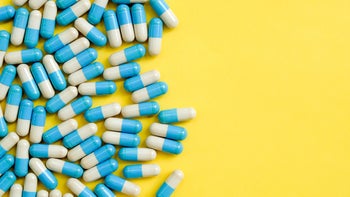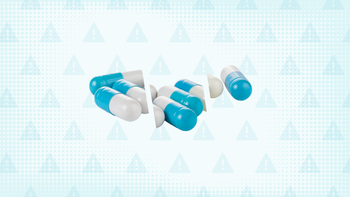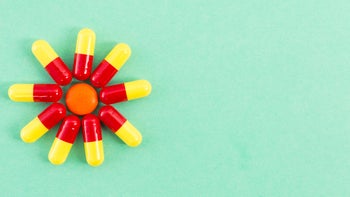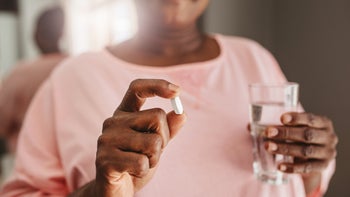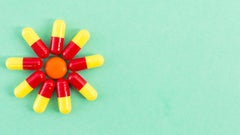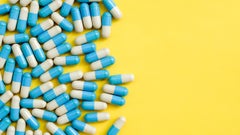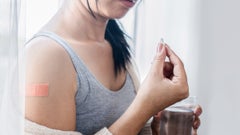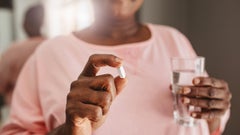
doxycycline hyclate
Doxycycline hyclate is an antibiotic that treats many conditions, including acne, chlamydia, sinus infection, and urinary tract infection (UTI). It's taken by mouth, typically once or twice daily. It come as capsules, tablets, and a liquid syrup. Side effects of doxycycline hyclate include stomach upset, nausea, and vomiting.

What is Doxycycline hyclate?
What is Doxycycline hyclate used for?
Doxycycline hyclate is used to prevent malaria due to the parasite Plasmodium falciparum and to treat many different infections caused by bacteria. Some examples include:
Respiratory tract infections, including in the nose, throat, and lungs
Infections caused by ticks, mites, or fleas (Rocky Mountain spotted fever or typhus fever)
Sexually-transmitted infections (STIs) like chlamydia, gonorrhea, chancroid, and syphilis
Lyme disease
Urinary tract infections (UTIs)
Severe acne
Anthrax
Plague
Cholera
How Doxycycline hyclate works
Doxycycline hyclate is a tetracycline antibiotic. It prevents some bacteria and parasites from making certain proteins, which stops them from multiplying and spreading in your body.
Drug Facts
More on Doxycycline hyclate essentials

Get your GoodRx coupon

What are the side effects of Doxycycline hyclate?
Common Side Effects
- Stomach upset
- Nausea
- Vomiting
- Loss of appetite
- Sunburn
Other Side Effects
- Diarrhea
- Swollen tongue
- Trouble swallowing
- Intestinal (gut) inflammation
- Vaginal yeast infection
- Rash
Serious Side Effects
- Infectious diarrhea: severe diarrhea, watery or bloody stools, stomach cramps, stomach pain, fever, loss of appetite, nausea, vomiting
- Pseudotumor cerebri or intracranial hypertension (high pressure in the brain): headache, dizziness, blurred vision, swelling inside eye, vision changes, double vision, vision loss
- Severe allergic reaction: itchy red rash (hives), trouble breathing, chest tightness, swelling of lips, tongue, face, or eyes
- Serious skin reactions: fever, chills, muscle aches, tiredness, rash, blistering or peeling skin
Source: DailyMed
More on Doxycycline hyclate side effects
The following side effects have also been reported
Along with its needed effects, a medicine may cause some unwanted effects. Although not all of these side effects may occur, if they do occur they may need medical attention.
Check with your doctor immediately if any of the following side effects occur:
Incidence not known
Blistering, peeling, or loosening of the skin
chills
clay-colored stools
dark urine
decreased appetite
diarrhea, watery and severe, which may also be bloody
difficulty with swallowing
dizziness
fast heartbeat
feeling of discomfort
headache
hives, itching, puffiness or swelling of the eyelids or around the eyes, face, lips, or tongue
hives or welts, itching, or rash
increased thirst
indigestion
inflammation of the joints
joint or muscle pain
large, hive-like swelling on the face, eyelids, lips, tongue, throat, hands, legs, feet, or sex organs
loss of appetite
numbness or tingling of the face, hands, or feet
pain in the stomach, side, or abdomen, possibly radiating to the back
red skin lesions, often with a purple center
redness and soreness of the eyes
redness of the skin
sores, ulcers, or white spots in the mouth or on the lips
stomach cramps
stomach pain or tenderness
swelling of the feet or lower legs
swollen, painful, or tender lymph glands in the neck, armpit, or groin
tightness in the chest
unusual tiredness or weakness
unusual weight loss
vomiting
yellow eyes or skin
Some side effects may occur that usually do not need medical attention. These side effects may go away during treatment as your body adjusts to the medicine. Also, your health care professional may be able to tell you about ways to prevent or reduce some of these side effects. Check with your health care professional if any of the following side effects continue or are bothersome or if you have any questions about them:
Incidence not known
Back, leg, or stomach pains
black, tarry stools
bleeding gums
blood in the urine or stools
blurred vision
bulging soft spot on the head of an infant
change in the ability to see colors, especially blue or yellow
chest pain, discomfort, or burning
cracks in the skin
decrease in vision
difficulty breathing
discoloration of the thyroid glands
double vision
general body swelling
increased sensitivity of the skin to sunlight
loss of heat from the body
lower back or side pain
nosebleeds
pain or burning in the throat
pain with swallowing
painful or difficult urination
pale skin
pinpoint red spots on the skin
rash with flat lesions or small raised lesions on the skin
red, swollen skin
redness or other discoloration of the skin
redness, swelling, or soreness of the tongue
severe nausea
severe stomach pain
severe sunburn
tooth discoloration
unusual bleeding or bruising
vomiting blood
Other side effects not listed may also occur in some patients. If you notice any other effects, check with your healthcare professional.
Call your doctor for medical advice about side effects. You may report side effects to the FDA at 1-800-FDA-1088.

Pros and cons of Doxycycline hyclate

Pros
Good alternative for some infections if you're allergic to penicillins
Treats many different infections, including severe acne and sexually transmitted infections (STIs) like chlamydia
Available as a liquid for those who have trouble swallowing pills
Likely safe for people who have kidney problems

Cons
Can raise your risk of sunburns
Can sometimes cause stomach discomfort or stomach upset
Interacts with blood thinners and birth control pills
Not safe for young children or pregnant females

Pharmacist tips for Doxycycline hyclate

Finish your entire course of doxycycline hyclate, even if you start to feel better. Stopping doxycycline hyclate too soon can cause your infection to come back and become harder to treat.
Take each dose of doxycycline hyclate with plenty of water to prevent burning, irritation, and ulcers in your esophagus (the tube that connects your throat to your stomach). Try not to lie down too soon after taking it to ensure it gets into your stomach.
If you're taking Vibramycin calcium (doxycycline calcium) syrup, make sure to use the measuring syringe or spoon provided by your pharmacist. Don't use household spoons or cups because this might cause you to take the wrong amount.
Antacids containing calcium, aluminum, and magnesium interact with doxycycline hyclate and affect how well it gets absorbed and works in your body. Examples include Tums or Rolaids. Other medications that interact with doxycycline hyclate include bismuth subsalicylate (Pepto-Bismol) and medications containing iron. If you take any of these medications, let your healthcare provider know before starting doxycycline hyclate.
You can carefully break Doryx tablets and sprinkle them over a spoonful of room temperature or cold applesauce and then swallow right away. Don't chew or crush the pellets because this can damage the medication.
Doxycycline hyclate can interact with your birth control pill and cause it to not to work as well. To prevent becoming pregnant, consider using an additional form of birth control, such as condoms, while taking doxycycline hyclate. Ask your pharmacist or healthcare provider if you have questions about other forms of birth control.
Doxycycline hyclate can interact with blood thinners and raise your risk of bleeding. Examples of blood thinners include warfarin (Coumadin), apixaban (Eliquis), and rivaroxaban (Xarelto). For your safety, your healthcare provider might lower the dose of your blood thinner while you're taking doxycycline hyclate.
Avoid spending too much time in the sun or using tanning beds while taking doxycycline hyclate, since it can make your skin more sensitive to sun damage. Wear protective clothing and sunscreen before going outside to reduce your risk of sunburn.
If you have to take doxycycline hyclate for a long time, your healthcare provider might perform routine blood tests to make sure your labs are within the normal range. Doxycycline hyclate can lower your red blood cells, white blood cells, and platelets, which are all necessary to build a strong immune system and to fight infections. Let your provider know if this concerns you.
If you experience severe diarrhea or watery, bloody stools while taking doxycycline hyclate or anytime after you stop, contact your provider.
More on Doxycycline hyclate tips

Frequently asked questions about Doxycycline hyclate

How to save using GoodRx




What are the risks and warnings for Doxycycline hyclate?
Doxycycline hyclate can cause some serious health issues. This risk may be even higher for certain groups. If this worries you, talk to your doctor or pharmacist about other options.

Permanent tooth discoloration
Risk factors: Children 8 years and younger | Pregnancy | Long-term use or repeated use of doxycycline hyclate
Tetracycline antibiotics, such as doxycycline hyclate, can cause permanent tooth discoloration and yellow, gray, or brown staining of teeth in babies and young children under the age of 8. It can also cause thinning of the teeth (enamel hypoplasia) and affect growth and development of teeth in children. The risk is higher with long-term use of the medication or with repeated short-term courses. The risk is also higher during the second half of pregnancy. If you're pregnant, breastfeeding, or your child is younger than 8 years old, avoid using doxycycline hyclate unless it's absolutely necessary to treat a life-threatening infection. Speak with your provider about the risks and benefits of this medication.

Severe diarrhea
Risk factors: Use of multiple antibiotics | Long-term use of antibiotics | Older age | History of colon or gut problems
Antibiotics, such as doxycycline hyclate, can cause severe diarrhea known as Clostridium difficile-associated diarrhea (commonly known as C. diff). Antibiotics get rid of the good bacteria in your gut and change the normal conditions of your gut and colon. This leads to the growth of bacteria like C. diff. This can happen any time while you're taking doxycycline hyclate and even over two months after you stop taking the antibiotic. C. diff diarrhea can become life-threatening if it isn't treated properly. Tell your healthcare provider right away if you have diarrhea, loose or watery stools, fever, stomach pain and cramps, nausea, vomiting, or loss of appetite.

Severe skin reactions
In some rare cases, people have developed really bad, potentially life-threatening skin reactions after starting doxycycline hyclate. These are types of allergic rashes that are painful and create blisters all over the body. Get medical help right away if you notice a new rash, have a rash and a fever, unexplained blisters, or new sores inside your mouth.

High pressure in the brain (intracranial hypertension or pseudotumor cerebri)
Risk factors: Women of childbearing age who are overweight or have history of high pressure in the brain | Taking isotretinoin with doxycycline hyclate | Taking other medications that raise pressure in the brain
Doxycycline hyclate can cause high pressure in your brain, a condition called intracranial hypertension or pseudotumor cerebri. The chances are higher in women of childbearing age who are either overweight or have a history of high pressure in the brain. The risk is also higher if you take doxycycline hyclate with isotretinoin (Absorica). It usually goes away after you stop taking doxycycline hyclate, but it can cause permanent vision loss. Call your healthcare provider right away if you have a headache, dizziness, blurred vision, swelling inside your eye, double vision, vision loss, or any vision changes.

Harm to unborn and young babies
Risk factors: Pregnancy | Women of childbearing age | Premature babies
Avoid using doxycycline hyclate if you're pregnant or plan on becoming pregnant because it can cause serious harm to your unborn baby. Doxycycline hyclate can cross the placenta and have harmful effects on the growth and development of your unborn baby's teeth and bones. It can also affect bone growth when given to babies who were born early. Pregnant women shouldn't take doxycycline hyclate unless it's absolutely necessary.

Sunburn
Risk factors: Exposure to sunlight or ultraviolet light
Doxycycline hyclate can make your skin more sensitive to sunlight and cause serious sunburns. Avoid direct exposure to sunlight by wearing sun-protective clothing, such as hats. Apply sunscreen or sunblock lotion before going outside, even on cloudy days. You should also avoid tanning beds while taking doxycycline hyclate. If you notice skin redness, irritation, or sunburn, stop taking doxycycline hyclate and let your healthcare provider know.

Damage to the esophagus
Make sure to take your dose of doxycycline hyclate with plenty of water and avoid lying down for at least 30 minutes afterwards. This is because if the medication is stuck in your esophagus, there's a risk that it can cause irritation and damage, and sometimes ulcers ,in the esophagus. Let your provider know right away if you start to feel pain or a burning sensation in your throat or chest. If your esophagus is damaged, then your provider might ask you to stop taking doxycycline hyclate.

New infections
Like other antibiotics, using doxycycline hyclate can lead to overgrowth of other bacteria or fungi. This can lead to a new infection, such as a vaginal yeast infection. Don't use this medication longer than prescribed. Let your provider know if you experience symptoms of an infection, such as fever, chills, or vaginal itching, discharge, or odor.

Drug-resistant bacteria
Risk factors: Taking doxycycline hyclate for a non-bacterial infection
You should only take doxycycline hyclate for bacterial infections. Using doxycycline hyclate or other antibiotics when they are not necessary can lead to drug-resistant bacteria, which are much harder to treat.

Doxycycline hyclate dosage forms
Typical dosing for Doxycycline hyclate
Treatment of infections: Your dose will depend on your condition. You should take the medication exactly as prescribed by your provider. In general:
Doxycycline hyclate (Acticlate, Doryx, Targadox, Vibramycin) and Vibramycin calcium (doxycycline calcium):
Adults and children (weight 99 lbs or more): The typical dose is 100 mg by mouth once or twice daily, depending on how serious your infection is.
Children 8 years and older (weight less than 99 lbs): Your child's provider will determine your child's dose based on their body weight. The typical dose is 2.2 mg/kg of body weight by mouth once or twice daily, depending on how serious the infection is.
Doryx MPC (doxycycline hyclate) tablets:
Adults and children (weight 99 lbs or more): The typical dose is 120 mg by mouth 2 times (12 hours apart) on the first day. The typical maintenance dose is 120 mg by mouth once daily or 60 mg twice daily, depending on how serious your infection is.
Children 8 years and older (weight less than 99 lbs): Your child's provider will determine your child's dose based on their body weight. The typical dose is 2.6 mg/kg of body weight by mouth once to twice daily, depending on how serious your infection is.
Prevention of malaria: Start 1 to 2 days before travel to malarious area and continue daily during travel and for 4 weeks after leaving the malarious area.
Doxycycline hyclate (Acticlate, Doryx, Targadox, Vibramycin) and Vibramycin calcium (doxycycline calcium):
Adults and children (weight 99 lbs or more): The typical dose is 100 mg by mouth once daily.
Children 8 years and older (weight less than 99 lbs): Your child's provider will determine your child's dose based on their body weight. The typical dose is 2 mg/kg of body weight by mouth once daily.
Doryx MPC (doxycycline hyclate) tablets:
Adults and children (weight 99 lbs or more) The typical dose is 120 mg by mouth once daily.
Children 8 years and older (weight less than 99 lbs) Your child's provider will determine your child's dose based on their body weight. The typical dose is 2.4 mg/kg of body weight by mouth once daily.
More on Doxycycline hyclate dosage forms

Interactions between Doxycycline hyclate and other drugs
More on Doxycycline hyclate interactions
Using this medicine with any of the following medicines is not recommended. Your doctor may decide not to treat you with this medication or change some of the other medicines you take.
Using this medicine with any of the following medicines is usually not recommended, but may be required in some cases. If both medicines are prescribed together, your doctor may change the dose or how often you use one or both of the medicines.
- Amoxicillin
- Ampicillin
- Ascorbic Acid
- Bacampicillin
- Bexarotene
- Cholera Vaccine, Live
- Cloxacillin
- Desogestrel
- Dicloxacillin
- Dienogest
- Drospirenone
- Estradiol
- Ethinyl Estradiol
- Ethynodiol
- Etretinate
- Gestodene
- Isotretinoin
- Levonorgestrel
- Mestranol
- Methicillin
- Methotrexate
- Methoxyflurane
- Nafcillin
- Nomegestrol
- Norethindrone
- Norgestimate
- Norgestrel
- Oxacillin
- Penicillin G
- Penicillin G Benzathine
- Penicillin G Procaine
- Penicillin V
- Piperacillin
- Pivampicillin
- Porfimer
- Sultamicillin
- Temocillin
- Tretinoin
Using this medicine with any of the following medicines may cause an increased risk of certain side effects, but using both drugs may be the best treatment for you. If both medicines are prescribed together, your doctor may change the dose or how often you use one or both of the medicines.
- Aluminum Carbonate, Basic
- Aluminum Hydroxide
- Aluminum Phosphate
- Aminolevulinic Acid
- Bismuth Subsalicylate
- Calcium
- Dihydroxyaluminum Aminoacetate
- Dihydroxyaluminum Sodium Carbonate
- Iron
- Magaldrate
- Magnesium Carbonate
- Magnesium Hydroxide
- Magnesium Oxide
- Magnesium Trisilicate
- Rifampin
- Rifapentine

How much does Doxycycline hyclate cost?

What are alternatives to Doxycycline hyclate?
Doxycycline hyclate is used to prevent malaria due to the parasite Plasmodium falciparum and to treat many different infections caused by bacteria. Some examples include:
Respiratory tract infections, including in the nose, throat, and lungs
Infections caused by ticks, mites, or fleas (Rocky Mountain spotted fever or typhus fever)
Sexually-transmitted infections (STIs) like chlamydia, gonorrhea, chancroid, and syphilis
Lyme disease
Urinary tract infections (UTIs)
Severe acne
Anthrax
Plague
Cholera
Sudden worsening of chronic obstructive pulmonary disease (COPD) from a bacterial infection
Skin infections (e.g., cellulitis)
Urethra or cervix infections
Ear infections (ages 6 months and older)
Pneumonia (ages 6 months and older)
Strep throat (ages 2 years and older)
Tonsil infections (ages 2 years and older)
Moderate-to-severe acne
Respiratory tract infections, including in the nose, throat, and lungs
Sexually transmitted infections (STIs) like chlamydia, gonorrhea, chancroid, and syphilis
Skin infections
Rickettsial infections (usually from ticks, fleas, or mites), such as Rocky Mountain spotted fever and typhus fever
Other infections such as anthrax, plague, cholera, and more. Doxycycline hyclate can be used to treat many other less common infections not listed here.

What is the latest news about Doxycycline hyclate?

Doxycycline hyclate images
Get savings updates for Doxycycline hyclate
Receive price alerts, news, and other messages from GoodRx about Doxycycline hyclate and other healthcare topics and relevant savings offers.By signing up, I agree to GoodRx's Terms and Privacy Policy, and to receive marketing messages from GoodRx.
References
Best studies we foundAcella Pharmaceuticals, LLC. (2022). DOXYCYCLINE- doxycycline hyclate tablet, coated [package insert]. DailyMed.
Centers for Disease Control and Prevention. (2019). Sinus infection (sinusitis).
Centers for Disease Control and Prevention. (2021). Be antibiotics aware: Smart use, best care.
Chow, A. W., et al. (2012). IDSA clinical practice guideline for acute bacterial rhinosinusitis in children and adults. Clinical Infectious Diseases.
Krout, C., et al. (2015). Tetracyclines: History and current formulation review from a dermatology perspective. Practical Dermatology.
Mayne Pharma Commercial LLC. (2023). DORYX MPC- doxycycline hyclate tablet, delayed release [package insert]. DailyMed.
Patel, R. S., et al. (2023). Doxycycline hyclate. StatPearls.
Pfizer Laboratories Div Pfizer Inc. (2023). VIBRAMYCIN MONOHYDRATE- doxycycline powder, for suspension. VIBRAMYCIN CALCIUM- doxycycline calcium syrup. VIBRAMYCIN HYCLATE- doxycycline hyclate capsule. VIBRA-TABS- doxycycline hyclate tablet, film coated [package insert]. DailyMed.
Sexually Transmitted Infections Treatment Guidelines, 2021. (2021). Chancroid. Centers for Disease Control and Prevention.
Snowden, J., et al. (2023). Rickettsial infection. StatPearls.
Tan, K. R., et al. (2011). Doxycycline for malaria chemoprophylaxis and treatment: Report from the CDC expert meeting on malaria chemoprophylaxi. The American Journal of Tropical Medicine and Hygiene.
Browse medications
View AllResearch prescriptions and over-the-counter medications from A to Z, compare drug prices, and start saving.


